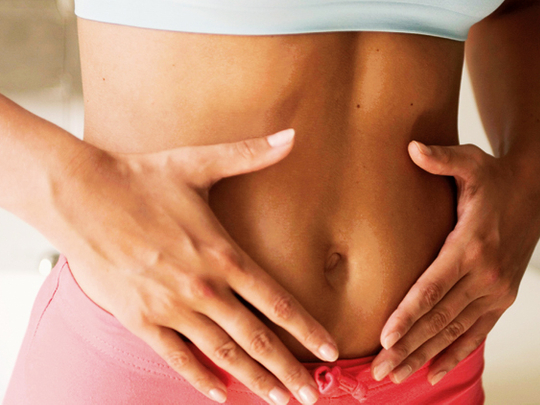
Meet the panel
Family doctor Dr Carole Chidiac is a family medicine specialist and medical director at Dr Akels Clinic (www.groupgmc.com).
Nutritionist Sarah Queen is a nutritional consultant and founder of Nutrition Matters Arabia (nutritionmattersarabia.com).
Fitness expert Gareth Shepherd is a personal trainer and fitness instructor at Core Direction (www.coredirection.com).
Psychologist Dr Saliha Afridi is a clinical psychologist and owner of The Lighthouse (www.lighthousearabia.com).
Lifecoach Emily Cheyne has her own lifecoaching company, Know-How-Group (www.know-how-group.com).
Q. What's the best exercise to help me lose weight from my stomach area?
A. Gareth says: "Clients often ask me this and are surprised when I tell them the answer is squats. It would take you 600,000 sit-ups to burn 1kg of body fat - good luck with that. Squats, however, use the majority of the big muscle groups, so you burn more calories, recruit more muscle fibres and raise the heart rate more.
"I'm not taking anything away from sit-ups and crunches - they definitely have their place in a good workout. But you cannot spot-build, or spot-reduce, one area of your body. That's a fact. Your genetics, body type and hormones will determine where you lose, or gain, weight - and aesthetic muscle isolation can only work if you're at high levels of fitness and you're below 10 per cent body fat. For a flatter stomach, you need to hit the whole body harder, and in less time, in order to produce a metabolic effect, so you burn calories for longer. The most effective way to do this is to incorporate squats into your workout."
Q. There are so many contraceptive pill brands on the market, how do you know which one is right for you? Are there brands that are better to use if you smoke?
A. Dr Chidiac says: "Most contraceptive pills contain low doses of oestrogen and progesterone. There is a new generation of pills with even lower dosages of oestrogen, but they're not yet available in the UAE. Though there are small differences in the components of these pills, and possible individual reactions necessitating switching from one brand to another, none of them are recommended in smokers above the age of 35, mainly because of the risk of DVF (deep venous thrombosis) in the leg veins. Non-smokers can keep taking the pills as long as they need.
"Female smokers above the age of 35 should consider other options, like IUDs [intrauterine devices], but the best option for these women would be to stop smoking."
Q. I've had four courses of IVF, none of them successful. I want to keep trying, but my husband doesn't as he thinks it's making me depressed. We are arguing a lot about this.
A. Dr Afridi says: "IVF is very difficult emotionally, mentally, physically and hormonally. With every cycle there is hope, and with every unsuccessful cycle, there is grief. I think both you and your husband are right and both need to be heard. I would recommend you sit together (with or without a psychologist) and discuss what IVF and having a child means to you. I also suggest you take time to make meaning out of your losses - we can get so caught up in wanting something that we lose sight of everything else: your feelings, your husbands' feelings and your marriage. In these situations, there is a significant grief for the hopes that you had. There are wounds on your spirit that need to be given the attention they need in order to heal."
Got a question for our experts? Email us at aquariusedit@alnisrmedia.com








